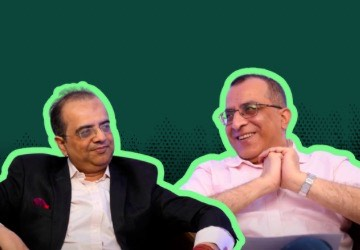
In a compelling episode of the Simple Hai! podcast hosted by veteran finance journalist Vivek Law, Dr. Samir Parikh, one of India’s foremost psychiatrists and Director of the Department of Mental Health and Behavioural Science at Fortis Healthcare, sheds light on the mental health epidemic sweeping the nation. In a wide-ranging conversation, Dr. Parikh unpacked the challenges, myths, and urgent needs around mental health in India—from adolescent education to corporate policies.
Mental Health: Still a Silent Epidemic
Despite increased awareness post-COVID, mental health remains an under-addressed concern both in India and globally. According to Dr. Parikh, three out of four people worldwide do not seek help for mental health issues. In India, the numbers are even more dire due to stigma, lack of access, and poor mental health literacy.
The pandemic may have triggered a spike in anxiety and depression, but the deeper problem is not new. “Mental health is not just the elephant in the room—it’s a herd of invisible elephants,” Dr. Parikh told Law.
The COVID Catalyst: A Moment of Shared Distress
COVID-19 served as a global moment of collective vulnerability, which opened the door for conversations about mental well-being. The World Health Organization (WHO) reported a 25% global increase in anxiety and depression during the pandemic. However, Dr. Parikh emphasized that this spike only revealed pre-existing cracks in the system, not new ones.
The pandemic, while devastating, also reminded society of the value of relationships, community, and minimalism—lessons we must retain.
Education Needs to Teach More Than Just Academics
For young people especially, education in India lacks crucial life skills. Dr. Parikh highlighted the importance of media literacy and emotional resilience, neither of which are standard parts of the school curriculum.
“Young people are bombarded with marketing messages and social comparisons. Without the tools to critically assess these, they begin to associate self-worth with consumption,” he said. The need to redefine education beyond subjects like physics and math is urgent, especially in the context of mental health awareness in schools.
Corporate India: Time to Make an impact
Dr. Parikh was clear: Corporate India is not doing enough. While some companies offer token wellness initiatives or one-off sessions, few integrate mental health into their core health programs.
He proposed three immediate changes:
- Include mental health in annual medical check-ups.
- Offer sustained access to psychologists and psychiatrists.
- Make mental health coverage a mandatory part of employee insurance and wellness policies.
Given the massive economic cost—$6 trillion by 2030 globally, as per WHO estimates—investing in mental well-being is not just humane; it’s strategic.
Workplace Stress Is a Major Trigger
Many mental health issues among adults are rooted in workplace stress—ranging from career stagnation and overwork to lack of recognition. Dr. Parikh stressed the need for organizations to create environments that promote psychological safety, skill development, and open dialogue.
Employment isn’t just financial security—it’s tied to identity, purpose, and mental stability. The workplace must reflect that.
Entrepreneurship and the Pressure to Succeed Young
India’s youth are embracing entrepreneurship like never before. But this rise comes with its own challenges. Young founders, often in their early 20s, face pressure, risk, and failure without adequate life experience or coping mechanisms.
While Dr. Parikh didn’t generalize, he warned that without robust mental health support systems, the entrepreneurial dream can quickly turn into burnout or breakdown.
Gambling, Trading & the Desire to Get Rich Quick
One of the more troubling trends post-pandemic has been the surge in risky financial behavior—online gambling, cryptocurrency trading, and speculative investments. According to SEBI data, most young retail investors lost money in derivatives trading.
Dr. Parikh categorized gambling addiction as a behavioral health disorder, influenced by easy access and aggressive promotion. “Access without awareness is a dangerous mix,” he added
Impatience: A Social Symptom of the Times
Whether it’s traffic honking, social media scrolling, or the inability to wait for wealth to compound, society is growing increasingly impatient. Dr. Parikh linked this to a broader lack of mindfulness and empathy. The need for instant gratification is compromising both financial discipline and emotional health.
Digital Detox and Social Media Boundaries
Dr. Parikh walks the talk: his phone is off by 7 PM daily. Though active on social media, he uses it only for mental health communication—not personal scrolling. He encourages digital detoxes and structured usage to reclaim attention and peace of mind.
Humanity and Kindness: The Missing Values
Ultimately, Dr. Parikh said he believed the solution lies not just in policy or access, but in rekindling kindness, empathy, and compassion. “You can compete without being cruel. You can be strong without being loud,” he said.
As someone who finds solace in music, reading, nature, and mindful eating, he embodies the balance he advocates. His advice to young professionals in mental health? “Keep reading, stay curious, and get out of your echo chamber.”
Conclusion: Schools and Workplaces Hold the Key
If India wants to tackle its mental health crisis, it must focus on two of the most structured spaces in people’s lives: schools and workplaces. Embedding mental health support in these institutions can create real, lasting change.
As Dr. Parikh concluded, “Mental health is not a luxury. It’s a necessity—for individuals, for organizations, and for society.”
Leave a Reply